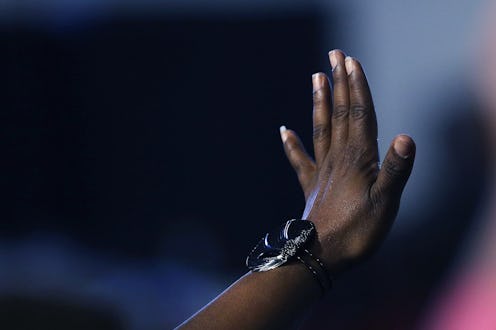News
Women Of Color Need This Candidate In The WH
Women of color exist at the intersection of several types of oppression. They are often viewed as sitting at the bottom of the societal totem pole, for both their underprivileged gender and race. And although all of the candidates promise to fight for women in some respects — even if that means taking away their reproductive rights, apparently — I believe one presidential candidate will do the most for WOC: Bernie Sanders. I would argue that his platform, with its specific focus on economic reform, has the true potential to benefit and radicalize the lives of women of color.
Women of color have, of course, been fighting for decades for themselves, jumping through massive societal hoops just to arguably get a place at the table. But with this presidential election, Sanders' policies could give an additional boost to more firmly secure that same, frequently unsteady place at the table. Through their votes, women of color have the potential to elect a real champion of their struggles into the White House this year.
A rise in economic power specifically could help liberate women of color from their multitude of oppression. The statistics on women of color's wage as compared with white men's demonstrates this harrowing gap. According to a report by New Republic, the 75 cents a woman earns to every man's dollar gets far, far worse when that woman is Hispanic, black, Native American, or a Pacific Islander. The worst (how lucky for me!) is for Latina women, settling in at a 54 percent earning for every dollar a white man earns. Just look at this chart, courtesy of The Economist.
These statistics are built around a few other discriminatory practices carried out in the United States, such as the practical economic punishment a woman endures after having a baby. Some of these include ridiculously expensive day care services and a lack of paid parental leave, which the United States is almost entirely unique in (Papua New Guinea is the only other county to not offer paid family leave, according to a report by Politifact.)
And there is, of course, just good ol' fashioned sexism and racism to account for, too. The Bureau of Labor Statistics found that despite having the same jobs or educational level, men will still outearn women nearly every time (the one exception: female stock clerks make an average of 120 dollars more each year than their male counterparts).
So why is Sanders the best choice to help end this economic injustice weighted heavily against women of color? His economic plans would target the very people and institutions that work to keep women of color down, while simultaneously lifting these women up. He would tax the ultra-wealthy and large corporations, creating a more equal playing field for women of color.
More specifically, he would increase the federal minimum wage to $15 an hour, sign the Paycheck Fairness Act into law which would guarantee equal pay among women and men, make tuition at public colleges free, require that employers offer paid family leave, and enact a universal, free childcare system. Each of these would target an aspect of income inequality that specifically hurts women of color. Higher paying jobs, a guarantee of equal pay for equal work, a clearer access to education, and a more stable environment to raise children is all part of candidate Sanders' staple platform.
Despite the bold nature of these proposals, Gerald Friedman, a University of Massachusetts Amherst economics professor, found that Sanders' economic program would do wonders for the economy. In an analysis given to CNNMoney, Friedman estimated that the median income would elevate by $22,000, 26 million jobs would be created, and unemployment rates would fall to 3.8 percent.
This economic freedom and security is one of the most important things a woman could have. For women of color, being able to move independently of many of the financial burdens racism and sexism have placed on them would make all the difference. Sanders is the only presidential candidate with policies that fully address this economic injustice women of color have battled for centuries.
Believe it or not, both primaries and caucuses can be laugh-out-loud hilarious. Don't believe us? Have a listen to Bustle's "The Chat Room" podcast...
